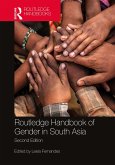The Routledge Handbook of Global Child Welfare
Herausgeber: Dolan, Pat; Frost, Nick
The Routledge Handbook of Global Child Welfare
Herausgeber: Dolan, Pat; Frost, Nick
- Gebundenes Buch
- Merkliste
- Auf die Merkliste
- Bewerten Bewerten
- Teilen
- Produkt teilen
- Produkterinnerung
- Produkterinnerung
In the context of the increasing global movement of people and a growing evidence base for differing outcomes in child welfare, Routledge Handbook of Global Child Welfare provides a compelling account of child welfare, grounded in the latest theory, policy and practice. Drawing on eminent international expertise, the book offers a coherent and comprehensive overview of the policies, systems and practices which can deliver the best outcomes for children. It considers the challenges faced by children globally, and the difference families, services and professionals can make. This ambitious and…mehr
Andere Kunden interessierten sich auch für
![The Routledge International Handbook of Ethnographic Film and Video The Routledge International Handbook of Ethnographic Film and Video]() The Routledge International Handbook of Ethnographic Film and Video317,99 €
The Routledge International Handbook of Ethnographic Film and Video317,99 €![Routledge Handbook of Contemporary South Korea Routledge Handbook of Contemporary South Korea]() Routledge Handbook of Contemporary South Korea317,99 €
Routledge Handbook of Contemporary South Korea317,99 €![Routledge Handbook of Gender in South Asia Routledge Handbook of Gender in South Asia]() Routledge Handbook of Gender in South Asia284,99 €
Routledge Handbook of Gender in South Asia284,99 €![The Routledge Handbook of Psychoanalysis in the Social Sciences and Humanities The Routledge Handbook of Psychoanalysis in the Social Sciences and Humanities]() The Routledge Handbook of Psychoanalysis in the Social Sciences and Humanities318,99 €
The Routledge Handbook of Psychoanalysis in the Social Sciences and Humanities318,99 €![Radicalism and the Revolt Against Reason (Routledge Revivals) Radicalism and the Revolt Against Reason (Routledge Revivals)]() Irving Louis HorowitzRadicalism and the Revolt Against Reason (Routledge Revivals)260,99 €
Irving Louis HorowitzRadicalism and the Revolt Against Reason (Routledge Revivals)260,99 €![The Routledge Atlas of South Asian Affairs The Routledge Atlas of South Asian Affairs]() Robert W. BradnockThe Routledge Atlas of South Asian Affairs317,99 €
Robert W. BradnockThe Routledge Atlas of South Asian Affairs317,99 €![Routledge Handbook of Critical Indigenous Studies Routledge Handbook of Critical Indigenous Studies]() Routledge Handbook of Critical Indigenous Studies318,99 €
Routledge Handbook of Critical Indigenous Studies318,99 €-
-
-
In the context of the increasing global movement of people and a growing evidence base for differing outcomes in child welfare, Routledge Handbook of Global Child Welfare provides a compelling account of child welfare, grounded in the latest theory, policy and practice. Drawing on eminent international expertise, the book offers a coherent and comprehensive overview of the policies, systems and practices which can deliver the best outcomes for children. It considers the challenges faced by children globally, and the difference families, services and professionals can make. This ambitious and far-reaching handbook is essential reading for everyone working to make the world a better and safer place for children.
Hinweis: Dieser Artikel kann nur an eine deutsche Lieferadresse ausgeliefert werden.
Hinweis: Dieser Artikel kann nur an eine deutsche Lieferadresse ausgeliefert werden.
Produktdetails
- Produktdetails
- Verlag: Routledge
- Seitenzahl: 408
- Erscheinungstermin: 16. Februar 2017
- Englisch
- Abmessung: 250mm x 175mm x 26mm
- Gewicht: 880g
- ISBN-13: 9781138942752
- ISBN-10: 1138942758
- Artikelnr.: 43673631
- Herstellerkennzeichnung
- Libri GmbH
- Europaallee 1
- 36244 Bad Hersfeld
- gpsr@libri.de
- Verlag: Routledge
- Seitenzahl: 408
- Erscheinungstermin: 16. Februar 2017
- Englisch
- Abmessung: 250mm x 175mm x 26mm
- Gewicht: 880g
- ISBN-13: 9781138942752
- ISBN-10: 1138942758
- Artikelnr.: 43673631
- Herstellerkennzeichnung
- Libri GmbH
- Europaallee 1
- 36244 Bad Hersfeld
- gpsr@libri.de
Pat Dolan is joint founder and Director of the UNESCO Child and Family Research Centre at the National University of Ireland, Galway. He holds the prestigious UNESCO Chair in Children, Youth and Civic Engagement, the first to be awarded in the Republic of Ireland. Nick Frost is Professor of Social Work at Leeds Beckett University. A qualified and registered social worker, he has been an independent chair of two Local Safeguarding Children Boards in England. He has written widely in relation to child protection, children in care and family support.
Introduction Part I: Historical and Theoretical Perspectives Introduction
to Part I 1. Children, Parents and the Family: 1500-1900 2. Child Welfare:
History and Origins 3. Children and Childhood: Viewed Through Different
Disciplinary Lenses Part II: Parenting, Resilience and Community Support
Introduction to Part II 4. Community Development Approaches in Response to
Neoliberalism: The Example of Eskasoni Mental Health Services, Canada 5.
The Centrality of Community: Achieving Child and Youth Welfare 6. Universal
Service Provision for Children and Young People: A Challenge for Policy
Makers 7. Child Welfare Practice in New Zealand: Challenges and
Possibilities Part III: Family Support Introduction to Part III 8.
Promoting Children's Welfare through Family Support 9. Contemporary Young
Motherhood: Global Perspectives of Everyday Experiences 10. The Relevance
of Youth Civic Engagement for Child Welfare: Lessons Learnt from Socialist
and Post-Socialist Slovenia 11. Children's Rights, Social Justice and
Family Support: Developing Inclusive, Intersectional and Participatory
Practice Part IV: Crime and Violence against Children Introduction to Part
IV 12. Preventing Child Sexual Exploitation: Would an International Age of
Consent to Sexual Activity Help Secure the Welfare of children? 13. Child
Labour Exploitation: A Historical and Global Perspective 14. Child Welfare
and Serbia on the Path Towards European Integration 15. The Impact of
Intimate Partner Violence on Children: A Global and Developmental Analysis
16. The Impact of Exposure to Domestic Abuse on Children and Young People:
Lessons from Research 17. Comparing Child Protection Systems: Towards a
Global Perspective Part V: Substitute Care Introduction to Part V 18.
Kinship Care for Children and Young People: International Perspectives 19.
International Adoption: A Global Challenge 20. Residential Care for
Children and Young People: Policy and Practice Challenges 21.
Institutionalisation and the Commodification of Children: How to Ensure
Children Regain their Right to Family Life Part VI: Promoting Positive
Practice Introduction to Part VI 22. From Relationship-Based Practice in
Child Welfare Services to Co-Production with Families 23.
Multi-Disciplinary Work with Children and Young People: Process and
Outcomes 24.Youth Mentoring as a Form of Support for Children and Young
People at Risk: Insights from Research and Practice 25. Activated Empathy
in Child Welfare and Youth Development: A Case for Consideration 26. The
Use of Play Skills During Child Protection and Welfare Assessments:
Building Relationships with Children to Explore Attachment Relationships
27. Conclusion,
to Part I 1. Children, Parents and the Family: 1500-1900 2. Child Welfare:
History and Origins 3. Children and Childhood: Viewed Through Different
Disciplinary Lenses Part II: Parenting, Resilience and Community Support
Introduction to Part II 4. Community Development Approaches in Response to
Neoliberalism: The Example of Eskasoni Mental Health Services, Canada 5.
The Centrality of Community: Achieving Child and Youth Welfare 6. Universal
Service Provision for Children and Young People: A Challenge for Policy
Makers 7. Child Welfare Practice in New Zealand: Challenges and
Possibilities Part III: Family Support Introduction to Part III 8.
Promoting Children's Welfare through Family Support 9. Contemporary Young
Motherhood: Global Perspectives of Everyday Experiences 10. The Relevance
of Youth Civic Engagement for Child Welfare: Lessons Learnt from Socialist
and Post-Socialist Slovenia 11. Children's Rights, Social Justice and
Family Support: Developing Inclusive, Intersectional and Participatory
Practice Part IV: Crime and Violence against Children Introduction to Part
IV 12. Preventing Child Sexual Exploitation: Would an International Age of
Consent to Sexual Activity Help Secure the Welfare of children? 13. Child
Labour Exploitation: A Historical and Global Perspective 14. Child Welfare
and Serbia on the Path Towards European Integration 15. The Impact of
Intimate Partner Violence on Children: A Global and Developmental Analysis
16. The Impact of Exposure to Domestic Abuse on Children and Young People:
Lessons from Research 17. Comparing Child Protection Systems: Towards a
Global Perspective Part V: Substitute Care Introduction to Part V 18.
Kinship Care for Children and Young People: International Perspectives 19.
International Adoption: A Global Challenge 20. Residential Care for
Children and Young People: Policy and Practice Challenges 21.
Institutionalisation and the Commodification of Children: How to Ensure
Children Regain their Right to Family Life Part VI: Promoting Positive
Practice Introduction to Part VI 22. From Relationship-Based Practice in
Child Welfare Services to Co-Production with Families 23.
Multi-Disciplinary Work with Children and Young People: Process and
Outcomes 24.Youth Mentoring as a Form of Support for Children and Young
People at Risk: Insights from Research and Practice 25. Activated Empathy
in Child Welfare and Youth Development: A Case for Consideration 26. The
Use of Play Skills During Child Protection and Welfare Assessments:
Building Relationships with Children to Explore Attachment Relationships
27. Conclusion,
Introduction Part I: Historical and Theoretical Perspectives Introduction
to Part I 1. Children, Parents and the Family: 1500-1900 2. Child Welfare:
History and Origins 3. Children and Childhood: Viewed Through Different
Disciplinary Lenses Part II: Parenting, Resilience and Community Support
Introduction to Part II 4. Community Development Approaches in Response to
Neoliberalism: The Example of Eskasoni Mental Health Services, Canada 5.
The Centrality of Community: Achieving Child and Youth Welfare 6. Universal
Service Provision for Children and Young People: A Challenge for Policy
Makers 7. Child Welfare Practice in New Zealand: Challenges and
Possibilities Part III: Family Support Introduction to Part III 8.
Promoting Children's Welfare through Family Support 9. Contemporary Young
Motherhood: Global Perspectives of Everyday Experiences 10. The Relevance
of Youth Civic Engagement for Child Welfare: Lessons Learnt from Socialist
and Post-Socialist Slovenia 11. Children's Rights, Social Justice and
Family Support: Developing Inclusive, Intersectional and Participatory
Practice Part IV: Crime and Violence against Children Introduction to Part
IV 12. Preventing Child Sexual Exploitation: Would an International Age of
Consent to Sexual Activity Help Secure the Welfare of children? 13. Child
Labour Exploitation: A Historical and Global Perspective 14. Child Welfare
and Serbia on the Path Towards European Integration 15. The Impact of
Intimate Partner Violence on Children: A Global and Developmental Analysis
16. The Impact of Exposure to Domestic Abuse on Children and Young People:
Lessons from Research 17. Comparing Child Protection Systems: Towards a
Global Perspective Part V: Substitute Care Introduction to Part V 18.
Kinship Care for Children and Young People: International Perspectives 19.
International Adoption: A Global Challenge 20. Residential Care for
Children and Young People: Policy and Practice Challenges 21.
Institutionalisation and the Commodification of Children: How to Ensure
Children Regain their Right to Family Life Part VI: Promoting Positive
Practice Introduction to Part VI 22. From Relationship-Based Practice in
Child Welfare Services to Co-Production with Families 23.
Multi-Disciplinary Work with Children and Young People: Process and
Outcomes 24.Youth Mentoring as a Form of Support for Children and Young
People at Risk: Insights from Research and Practice 25. Activated Empathy
in Child Welfare and Youth Development: A Case for Consideration 26. The
Use of Play Skills During Child Protection and Welfare Assessments:
Building Relationships with Children to Explore Attachment Relationships
27. Conclusion,
to Part I 1. Children, Parents and the Family: 1500-1900 2. Child Welfare:
History and Origins 3. Children and Childhood: Viewed Through Different
Disciplinary Lenses Part II: Parenting, Resilience and Community Support
Introduction to Part II 4. Community Development Approaches in Response to
Neoliberalism: The Example of Eskasoni Mental Health Services, Canada 5.
The Centrality of Community: Achieving Child and Youth Welfare 6. Universal
Service Provision for Children and Young People: A Challenge for Policy
Makers 7. Child Welfare Practice in New Zealand: Challenges and
Possibilities Part III: Family Support Introduction to Part III 8.
Promoting Children's Welfare through Family Support 9. Contemporary Young
Motherhood: Global Perspectives of Everyday Experiences 10. The Relevance
of Youth Civic Engagement for Child Welfare: Lessons Learnt from Socialist
and Post-Socialist Slovenia 11. Children's Rights, Social Justice and
Family Support: Developing Inclusive, Intersectional and Participatory
Practice Part IV: Crime and Violence against Children Introduction to Part
IV 12. Preventing Child Sexual Exploitation: Would an International Age of
Consent to Sexual Activity Help Secure the Welfare of children? 13. Child
Labour Exploitation: A Historical and Global Perspective 14. Child Welfare
and Serbia on the Path Towards European Integration 15. The Impact of
Intimate Partner Violence on Children: A Global and Developmental Analysis
16. The Impact of Exposure to Domestic Abuse on Children and Young People:
Lessons from Research 17. Comparing Child Protection Systems: Towards a
Global Perspective Part V: Substitute Care Introduction to Part V 18.
Kinship Care for Children and Young People: International Perspectives 19.
International Adoption: A Global Challenge 20. Residential Care for
Children and Young People: Policy and Practice Challenges 21.
Institutionalisation and the Commodification of Children: How to Ensure
Children Regain their Right to Family Life Part VI: Promoting Positive
Practice Introduction to Part VI 22. From Relationship-Based Practice in
Child Welfare Services to Co-Production with Families 23.
Multi-Disciplinary Work with Children and Young People: Process and
Outcomes 24.Youth Mentoring as a Form of Support for Children and Young
People at Risk: Insights from Research and Practice 25. Activated Empathy
in Child Welfare and Youth Development: A Case for Consideration 26. The
Use of Play Skills During Child Protection and Welfare Assessments:
Building Relationships with Children to Explore Attachment Relationships
27. Conclusion,








